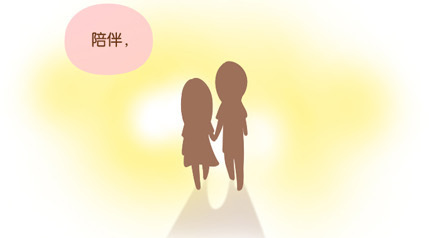(单词翻译:单击)
小故事
The Road to Happiness
幸福之道
If you look around at the men and women whom you can call happy, you will see that they all have certain things in common. The most important of these things is an activity which at most gradually builds up something that you are glad to see coming into existence. Women who take an instinctive pleasure in their children can get this kind of satisfaction out of bringing up a family. Artists and authors and men of science get happiness in this way if their own work seems good to them. But there are many humbler forms of the same kind of pleasure. Many men who spend their working life in the city devote their weekends to voluntary and unremunerated toil in their gardens, and when the spring comes, they experience all the joys of having created beauty.
只要你观察一下周围那些你可称之为幸福的男男女女,就会看出他们都有某些共同之处。在这些共同之处中有一点是最重要的:那就是活动本身,它在大多数情况下本身就很有趣,而且可逐渐的使你的愿望得以实现。生性喜爱孩子的妇女,能够从抚养子女中得到这种满足。艺术家、作家和科学家如果对自己的工作感到满意,也能以同样的方式得到快乐。不过,还有很多是较低层次的快乐。许多在城里工作的人到了周末自愿地在自家的庭院里做无偿的劳动,春天来时,他们就可尽情享受自己创造的美景带来的快乐。
The whole subject of happiness has, in my opinion, been treated too solemnly. It had been thought that man cannot be happy without a theory of life or a religion. Perhaps those who have been rendered unhappy by a bad theory may need a better theory to help them to recovery, just as you may need a tonic when you have been ill. But when things are normal a man should be healthy without a tonic and happy without a theory. It is the simple things that really matter. If a man delights in his wife and children, has success in work, and finds pleasure in the alternation of day and night, spring and autumn, he will be happy whatever his philosophy may be. If, on the other hand, he finds his wife fateful, his children's noise unendurable, and the office a nightmare; if in the daytime he longs for night, and at night sighs for the light of day, then what he needs is not a new philosophy but a new regimen — a different diet, or more exercise, or what not.
在我看来,整个关于快乐的话题一向都被太严肃的对待过了。过去一直有这样的看法:如果没有一种生活的理论或者宗教信仰,人是不可能幸福的。也许那些由于理论不好才导致不快乐的人需要一种较好的理论帮助他们重新快活起来,就像你生过病需要吃补药一样。但是,正常情况下,一个人不吃补药也应当是健康的;没有理论也应当是幸福的。真正有关系的是一些简单的事情。如果一个男人喜爱他的妻子儿女,事业有成,而且无论白天黑夜,春去秋来,总是感到高兴,那么不管他的理论如何,都会是快乐的。反之,如果他讨厌自己的妻子,受不了孩子们的吵闹,而且害怕上班;如果他白天盼望夜晚,而到了晚上又巴望着天明,那么,他所需要的就不是一种新的理论,而是一种新的生活——改变饮食习惯,多锻炼身体等等。
Man is an animal, and his happiness depends on his physiology more than he likes to think. This is a humble conclusion, but I cannot make myself disbelieve it. Unhappy businessmen, I am convinced, would increase their happiness more by walking six miles every day than by any conceivable change of philosophy.
人是动物,他的幸福更多的时候取决于其生理状况而非思想状况。这是一个很庸俗的结论,然而我无法使自己怀疑它。我确信,不幸福的商人与其找到新的理论来使自己幸福,还不如每天步行六英里更见效。

重点讲解
重点讲解:
1. in common
共有的;相同的;
eg. Jane and I have nothing in common.
简和我毫无共同之处。
eg. The most extreme opposites have some qualities in common.
极端相反的事物间是多少有些共性的。
2. devote sth. to sth./doing sth.
献(身);奉献,投入(时间、精力等);
eg. Then I wanted to devote the rest of my life to public service.
然后,我就想把余生奉献给公众服务。
eg. She had started to devote her energies to teaching rather than performing.
她已经开始将精力从表演转移到教学中。
3. in one's opinion
在…看来;据…的意见;
eg. The book is, in Henry's opinion, the best book on the subject...
依照亨利的看法,这本书是关于该主题的最佳著述。
eg. Well he's not making a very good job of it in my opinion.
然而,在我看来,这件事他做得不尽如人意。
4. delight in
(以…)为乐;喜欢;爱好;
eg. Generations of adults and children have delighted in the story.
一代又一代的成年人和儿童都很喜欢这个故事。
eg. He delighted in sharing his love of birds with children.
他喜欢与孩子们分享他对鸟类的热爱。
5. on the other hand
从)另一方面(来说)(用于引出相对照的另一点);
eg. On the other hand, the idea appealed to him.
从另一方面来说,这个想法又使他很感兴趣。
eg. On the other hand one must be thoroughly prepared for all eventualities.
另一方面,一个人对一切不测应有完全的准备。
6. long for
渴望;渴求;企盼;
eg. Senior citizens long for a more predictable and secure future.
老年人渴望有一个更稳定、更可预见的未来。
eg. Easter to long for is going in a day.
朝朝盼节日,节日一日逝。
7. depend on
取决(于);有赖(于);
eg. Whether or not you qualify for a loan will depend on your financial circumstances.
你是否有资格申请贷款取决于你的经济状况。
eg. And the next step up the ladder would depend on her performance in Paris.
而她的下一次晋升就取决于她在巴黎的工作表现。
8. more...than...
更像(前者)地;与其说(是)…,倒不如说(是);
eg. She looked more sad than in pain.
她看起来更多的是悲伤,而不是疼痛。
eg. He was more concerned about my husband's money than about his duty.
与其说他关心他的职责,倒不如说他关心我丈夫的钱。


